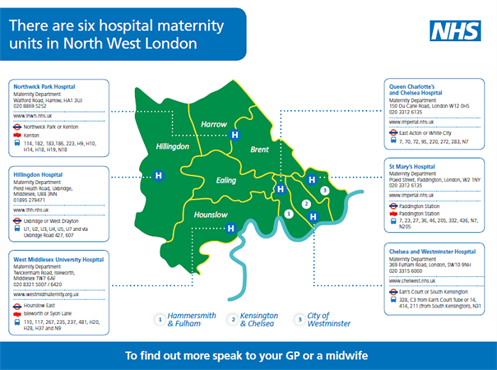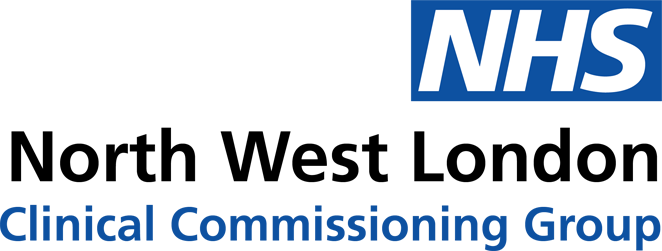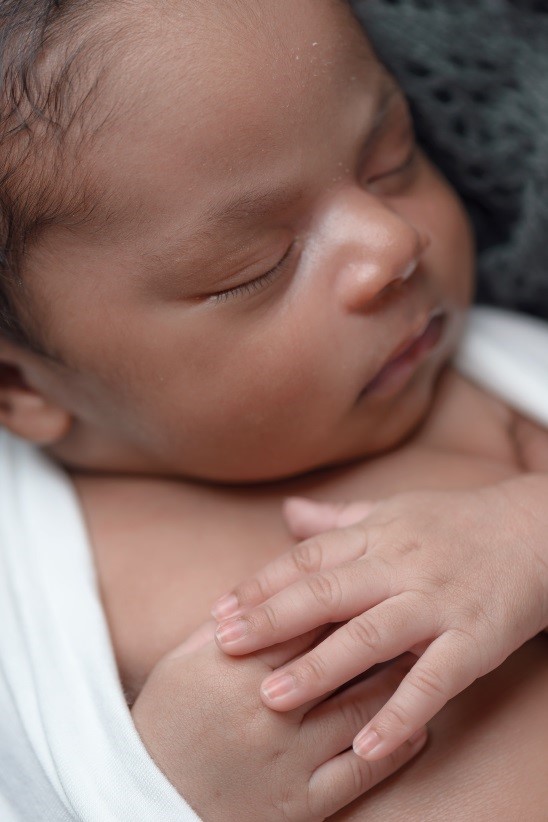Pregnancy and maternity services

The NHS in North West London is dedicated to ensuring that women have access to the highest possible quality of care throughout their pregnancy and birth.
Our staff and resources are concentrated into six maternity units which mean more midwives and senior consultants are available to provide care for women.
Your choices
In North West London there are six hospitals where you can give birth:
- Chelsea and Westminster
- Hillingdon
- Northwick Park
- Queen Charlotte’s and Chelsea
- St Mary’s
- West Middlesex

Choice of care
You can choose to give birth at home, where you will be supported by our home birth team.
Antenatal care is carried out in our hospitals, in children’s centres and in health centres close to where you live. Most women can choose where they receive antenatal care, although some women with particular medical needs may be advised to attend hospital for appointments.
How to book
You can be referred to any of our maternity units by your GP, or you can complete a referral form on the individual hospital websites, which are listed above.
Whichever hospital you choose for your care, all maternity units in North West London include the following services:
- Birth centre
- Birth rooms
- Birthing pools
- Midwife-led care Consultant cover
- Home birth option
- Antenatal ward
- Antenatal care in the community Neonatal care
- Postnatal ward
- Postnatal care in the community Postnatal care at home
- Private room hire
- Option for partner to stay overnight
Expert care
- Midwife-led care for the majority of our women with access to a highly experienced team of midwives 24- hours- a-day, seven-days-a-week.
- Increased consultant cover for women who require more complex care and support.
- Experts from different areas of healthcare and other health professions as required.
- Support for women who choose to have their babies at home.
Health visitors
Take a look at our video below to find out what health visitors do:
Modern facilities
 Birthing centres which include rooms with birthing pools.
Birthing centres which include rooms with birthing pools.- Labour wards with specialist maternity theatres.
- Recovery areas for women who have given birth in theatre.
- Special Care Baby Units and intensive care units for babies requiring continuous medical and nursing care due to prematurity or complex needs.
North West London antenatal videos
Due to the coronavirus pandemic, the NHS in North West London have made it easier for pregnant women to continue getting the maternity care that they need without having to visit the hospital as often.
Our maternity hospitals have worked together to produce a series of videos that cover all the topics usually presented during traditional face to face antenatal classes.
Click on a title below for each video:
- Antenatal prep course part 1
- Antenatal prep course part 2
- Antenatal prep course part 3
- Gestational diabetes part 1
- Gestational diabetes part 2
- Gestational diabetes part 3
- Birth choices
- Home birth
- Breathing
- Early days part 1
- Early days part 2.
The videos offer a great alternative to the live classes usually attended by women and couples.
It is important that you still attend any antenatal appointments with your midwife or maternity team. Please do also contact them if you are worried about your health or the health of your unborn baby.
More information about pregnancy and coronavirus can also be found here.
Reduced Fetal Movements in pregnancy videos
Our maternity team have produced videos in a range of different languages highlighting the importance of monitoring fetal movement during pregnancy.
Click on a title below for each video:
- The importance of monitoring fetal movements (Albanian)
- The importance of monitoring fetal movements (Arabic)
- The importance of monitoring fetal movements (Bengali)
- The importance of monitoring fetal movements (Bulgarian)
- The importance of monitoring fetal movements (Cantonese)
- The importance of monitoring fetal movements (English)
- The importance of monitoring fetal movements (Farsi)
- The importance of monitoring fetal movements (Gujarati)
- The importance of monitoring fetal movements (Hindi)
- The importance of monitoring fetal movements (Japanese)
- The importance of monitoring fetal movements (Lithuanian)
- The importance of monitoring fetal movements (Mandarin)
- The importance of monitoring fetal movements (Polish)
- The importance of monitoring fetal movement (Portuguese
- The importance of monitoring fetal movements (Punjabi)
- The importance of monitoring fetal movements (Romanian)
- The importance of monitoring fetal movements (Sign language)
- The importance of monitoring fetal movements (Somali)
- The importance of monitoring fetal movement (Tamil)
- The importance of monitoring fetal movement (Turkish)
- The importance of monitoring fetal movement (Urdu)
The videos offer a great alternative to the live classes usually attended by women and couples.
Download the mum and baby app
 The Mum & Baby App is a resource for pregnant people, new parents and their families to access information on caring for themselves and their new baby.
The Mum & Baby App is a resource for pregnant people, new parents and their families to access information on caring for themselves and their new baby.
This award-winning app has been co-designed with mothers, partners, midwives, doctors, mental health specialists, health visitors, physiotherapists and other allied health professionals across England to provide a single source of information relevant to the entire maternity journey and beyond.
Through the app, you can explore local maternity service providers, refer yourself to the maternity services of your choice using the online self-referral form.
There is also information to guide you through the different stages of pregnancy, and the option to develop digital personalised care and support plans (PCSP) for pregnancy, birth and beyond.
These PCSPs can be shared with your maternity team to enhance better communication and shared decision making.
The app empowers pregnant people and their families with evidenced based information to allow them to be more involved in their maternity care.
The app can be downloaded for free via the App store or Google Play and used by maternity services across North West London.









